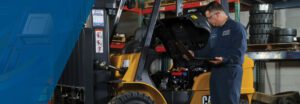
The Benefits Of Renting A Forklift
Flexibility is critical for businesses and renting forklifts can be a surprisingly easy way to cut costs on a short-term basis. However, to maximize the
As a lift truck dealership with decades of material handling experience, we can relatively predict the future life span of many lift trucks. The clues to a much shorter-than-normal lift truck lifetime are often obvious – and should be avoided.
Read on to learn the top 4 practices that impact lift truck life span and discover practical solutions for how to avoid them.
Not having a lift truck or your entire fleet regularly maintained can jeopardize the trucks’ performance and useful life. A lack of regular forklift planned maintenance is one of the leading causes of lift truck premature aging.
Here’s why:
Remember, the brief time a lift truck is down for Planned Maintenance is nothing compared to the days of lost productivity when a major component or system fails. Then there’s the cost of replacement parts that add to the cost of downtime.
How to avoid this:
If you feel like you don’t have time to put together a forklift maintenance schedule to see that proper PMs are performed, we can help.
Tri-Lift NJ offers flexible planned maintenance programs tailored to your needs, applications and workloads. We’ll take PM details off your agenda and make them our priority.
Lift trucks got their name because they’re designed to lift and carry a load. Heavy pushing of loads, shoving pallets instead of lifting and moving them, or using a lift truck to tow can all cause stress which leads to premature wear and component failure.
These practices are especially hard on battery-powered (electric) lift trucks because they can cause:
Engine-powered lift trucks also suffer from pushing and towing abuse, causing things like:
This type of abuse doesn’t need to be frequent to cause problems.
Damage can occur almost immediately. For example, an operator can stall an electric drive motor when pushing against a stubborn or immovable object. This can raise its internal temperature beyond critical levels in just a few seconds.
How to avoid this:
Understand the proper usage guidelines for your forklifts. Train your forklift operators to understand best practices. Tri-Lift NJ can help assess your business’ lift truck usage and provide practical tips to improve the process, flow or avoid costly damage and abuse from lift truck misuse.
If you don’t have time to talk with lift truck operators about how the fleet is running or make time to review daily forklift inspection sheets, you may be missing:
How to avoid this:
Tri-Lift NJ service technicians are here to help. During a PM, they speak directly with operators to assess the current forklift fleet and can make needed adjustments to match your business needs and manufacturers’ recommended settings.
Although today’s lift truck models are more durable than ever before, overuse can accelerate wear. If you operate a lift truck constantly at full capacity in high-cycle applications, you work their systems to their limits. Soon, those overworked components wear out. That’s why high-cycle applications should stick to a PM schedule based on hours of use.
How to avoid this:
Contact us about the proper PM schedule that best fits your application.
You can help extend lift truck life by working with Tri-Lift NJ. Through our Planned Maintenance programs, we can advise you of future performance issues and timely replacement schedules. Through regular visits, we can discuss how changes in the application may impact lift truck maintenance, productivity and selection.
Forklift maintenance costs largely depend on your maintenance practices. If you stick to your planned maintenance schedule, use the forklift as it was designed, and keep up on regular inspections you’ll find that your lifetime costs will be greatly reduced.
Contact us to learn more about our forklift planned maintenance options, good lift truck practices, and practices to avoid for maximum truck life and productivity. We’re here to make your business more efficient.

Flexibility is critical for businesses and renting forklifts can be a surprisingly easy way to cut costs on a short-term basis. However, to maximize the

When it comes to lift truck fleet management, knowledge is power, especially when it comes to reducing your forklift maintenance costs. Factors such as forklift
732.220.0444
1471 Jersey Avenue
North Brunswick, NJ 08902